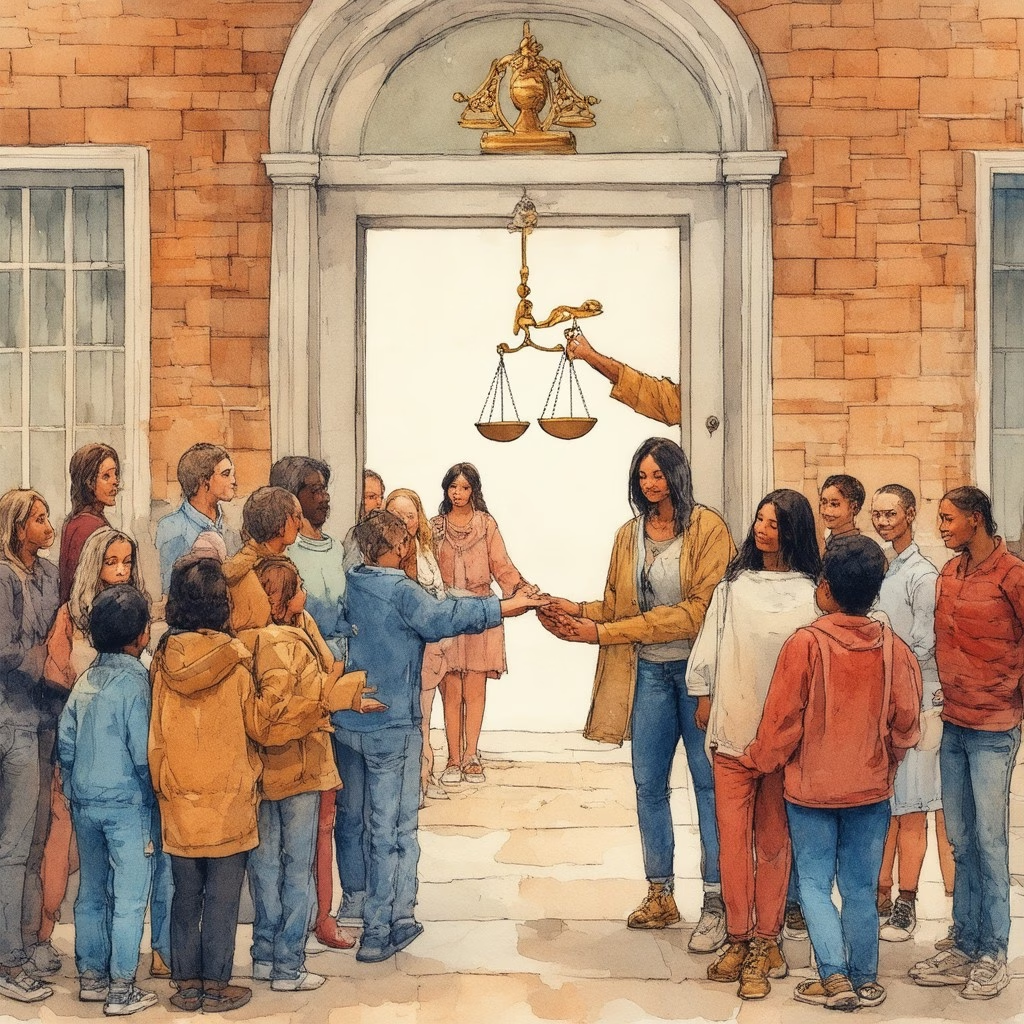Key Takeaways
- Access essential legal aid services to navigate the legal system without high costs.
- Eligibility for low-income legal assistance typically requires meeting specific income guidelines.
- Find free legal services in your area through online searches, local bar associations, and community organizations.
- Common legal issues covered include family law, housing disputes, and public benefits.
- Utilize resources like the Legal Services Corporation for directories and support in accessing free attorneys.
- Prepare necessary documentation before contacting legal aid to expedite the assistance process.
Are you wondering how can I get a legal aid lawyer? Navigating the legal system can be daunting, especially for low-income families who may feel overwhelmed by the costs associated with hiring a lawyer. Fortunately, there are resources available that provide free legal services and support tailored to those in need. In this comprehensive guide, we will explore the various legal aid legal services available, including what they cover and how to access them. We will also discuss eligibility criteria, the costs associated with legal aid lawyers, and how to find free attorneys near you. Whether you need assistance with family law, divorce, or civil suits, this article will equip you with the knowledge to secure the legal advice for free that you deserve. Join us as we delve into the essential steps to access low-income legal assistance and ensure you have the support you need during challenging times.
Understanding Legal Aid Services
When facing legal challenges, many individuals find themselves asking, how can I get a legal aid lawyer? Legal aid services are designed to assist those who cannot afford legal representation. These services provide essential support, ensuring that everyone has access to justice, regardless of their financial situation. Understanding what legal aid entails and how to access it is crucial for those in need.
What is it called when you can’t afford a lawyer?
When you cannot afford a lawyer, you may seek legal aid legal services. This term refers to the assistance provided by organizations that offer free or low-cost legal representation to individuals who meet specific income criteria. These services are vital for ensuring that low-income individuals can navigate the legal system without the burden of high attorney fees. In many cases, legal aid organizations also provide free attorneys who specialize in various areas of law, including family law, housing disputes, and immigration issues.
Legal aid legal services: What do they cover?
Legal aid services cover a wide range of legal issues. Common areas include:
- Family Law: Assistance with divorce, child custody, and domestic violence cases. Many organizations offer free family lawyers for low-income families.
- Housing Issues: Help with eviction proceedings, landlord disputes, and housing discrimination cases.
- Public Benefits: Guidance on applying for government assistance programs and appealing denied benefits.
- Consumer Rights: Support in cases of debt collection, bankruptcy, and unfair business practices.
For more detailed information on accessing these services, you can explore resources like understanding legal aid options or steps for accessing legal aid.

Understanding Legal Aid Services
When you find yourself in a situation where you need legal assistance but cannot afford a lawyer, understanding the available legal aid services is crucial. Legal aid provides essential support to individuals who qualify based on income and specific legal needs. This section will explore what it’s called when you can’t afford a lawyer and the various legal aid legal services available to you.
What is it called when you can’t afford a lawyer?
When you cannot afford a lawyer, you are often referred to as being in need of legal aid. Legal aid is a system designed to ensure that low-income individuals have access to legal representation and advice. This support can come in various forms, including free legal consultations, representation in court, and assistance with legal documents. Many organizations, such as the Legal Services Corporation, provide resources to help you find the necessary legal aid help.
Legal aid legal services: What do they cover?
Legal aid legal services cover a wide range of issues, primarily focusing on civil matters. Here are some common areas they address:
- Family Law: Assistance with divorce, child custody, and domestic violence cases. You can find free family lawyers who specialize in these areas.
- Housing Issues: Help with eviction proceedings, landlord disputes, and housing discrimination cases.
- Public Benefits: Guidance on applying for government assistance programs, including food stamps and unemployment benefits.
- Consumer Protection: Support with debt collection, bankruptcy, and unfair business practices.
These services are designed to provide legal advice for free to those who qualify, ensuring that everyone has access to justice, regardless of their financial situation. If you need assistance, consider reaching out to local legal aid organizations or visiting resources like steps for accessing legal aid.
Understanding Legal Aid Services
When you find yourself in a situation where you cannot afford a lawyer, understanding legal aid services becomes crucial. Legal aid provides essential support for individuals who need legal assistance but lack the financial resources to hire a private attorney. This section will explore what it means when you can’t afford a lawyer and the various legal aid legal services available to you.
What is it called when you can’t afford a lawyer?
When you cannot afford a lawyer, you may seek legal aid, which refers to free or low-cost legal services provided to individuals based on their income level. This assistance is often available through nonprofit organizations, legal aid societies, and government programs designed to ensure that everyone has access to justice, regardless of their financial situation. If you find yourself in this position, it’s important to know that there are resources available to help you navigate your legal challenges.
Legal aid legal services: What do they cover?
Legal aid legal services cover a wide range of issues, including but not limited to:
- Family law matters, such as divorce and child custody
- Housing issues, including eviction and landlord disputes
- Employment-related legal problems
- Consumer protection cases
- Public benefits and social security issues
These services aim to provide legal advice for free or at a reduced cost, ensuring that low-income individuals and families can access the help they need. If you are looking for free lawyers for low-income families, consider reaching out to local legal aid organizations or visiting resources like the Legal Services Corporation for more information on available services.
Finding Legal Aid Near You
When you’re in need of legal assistance but wondering how can I get a legal aid lawyer, the first step is to locate legal aid services in your area. Accessing legal aid legal services can be a straightforward process if you know where to look. Here’s how to find the right resources tailored to your needs.
Legal Aid near Me: How to Locate Services
To find legal aid near you, consider the following steps:
- Online Search: Use search engines to look for legal aid services in your state or city. Phrases like “understanding legal aid options” can lead you to valuable resources.
- Local Bar Associations: Many local bar associations offer referral services to connect you with free attorneys or low-income legal assistance. Check the American Bar Association website for more information.
- Community Organizations: Nonprofits and community organizations often provide legal advice for free or can direct you to legal aid help. Look for organizations focused on family law, housing, or immigration.
- Legal Aid Hotlines: Many states have hotlines where you can get immediate legal advice. For example, you can access a free legal aid hotline for 24/7 support.
Free Legal Aid Near Me: Resources and Tips
Finding free legal aid can be crucial, especially if you’re facing financial difficulties. Here are some tips to maximize your search:
- Check Eligibility: Many legal aid services have specific eligibility criteria based on income. Ensure you meet these requirements to qualify for assistance.
- Utilize Online Resources: Websites like Legal Services Corporation provide directories of legal aid offices across the country.
- Ask for Referrals: If you know someone who has accessed free lawyers for low-income families, ask them for recommendations on where to start.
- Be Prepared: When you contact a legal aid office, have all necessary documentation ready, including income statements and details about your legal issue, to expedite the process.

Eligibility Criteria for Legal Aid
Understanding the eligibility criteria for legal aid is crucial for those asking, how can I get a legal aid lawyer? Legal aid services are designed to assist individuals who cannot afford legal representation, ensuring that everyone has access to justice. The primary factor in determining eligibility is income, but there are additional considerations to keep in mind.
Low-income legal assistance: Who qualifies?
To qualify for low-income legal assistance, applicants typically need to meet specific income guidelines set by legal aid organizations. These guidelines often vary by state and are based on the federal poverty level. Generally, individuals or families earning less than 125% to 200% of the federal poverty line may be eligible for services. It’s essential to check with your local legal aid office to understand the exact income thresholds and any additional requirements.
In addition to income, legal aid organizations may consider factors such as:
- Type of legal issue: Legal aid services often focus on specific areas, such as family law, housing, or public benefits.
- Residency: Applicants usually need to be residents of the state where they are seeking assistance.
- Citizenship status: Many legal aid services require applicants to be U.S. citizens or legal residents.
How can I get a lawyer with low income?
If you find yourself in a situation where I need a lawyer and I have no money, there are several steps you can take to secure legal representation:
- Contact local legal aid organizations: Reach out to organizations in your area that provide legal aid legal services. They can guide you through the application process and inform you about your eligibility.
- Utilize online resources: Websites like the Legal Services Corporation offer directories to help you find legal aid services near you.
- Seek free attorney consultations: Many lawyers offer free attorney consultations to discuss your case and determine if they can assist you.
- Explore pro bono services: Some attorneys provide pro bono (free) legal services for low-income individuals. Check local bar associations for lists of attorneys willing to take on such cases.
By understanding the eligibility criteria and taking proactive steps, you can effectively navigate the process of obtaining a legal aid lawyer and ensure that you receive the legal advice for free that you need.
Understanding Legal Aid Services
What is it called when you can’t afford a lawyer?
When you can’t afford a lawyer, you may seek assistance through legal aid services. Legal aid refers to a range of legal services provided to individuals who cannot afford to pay for legal representation. This support is typically offered by nonprofit organizations and government agencies that focus on helping low-income individuals navigate legal issues. In many cases, these services are referred to as “pro bono” work, which means that attorneys provide their services for free or at a significantly reduced cost. If you find yourself in a situation where you need legal assistance but lack the financial resources, understanding how to access these legal aid services is crucial.
Legal aid legal services: What do they cover?
Legal aid services cover a variety of legal issues, primarily focusing on civil matters. Common areas of assistance include:
– **Family Law**: Legal aid can help with divorce proceedings, child custody disputes, and domestic violence cases. Many organizations offer free family lawyers who specialize in these areas.
– **Housing Issues**: If you are facing eviction or need help with landlord-tenant disputes, legal aid can provide the necessary legal advice and representation.
– **Public Benefits**: Legal aid services often assist individuals in navigating the complexities of government benefits, ensuring that eligible individuals receive the support they need.
– **Consumer Protection**: Issues such as debt collection, fraud, and bankruptcy can also fall under the purview of legal aid services.
– **Immigration Matters**: Some legal aid organizations provide assistance with immigration applications and related legal issues.
For more detailed information on accessing these services, you can refer to resources such as the [Legal Services Corporation](https://www.lsc.gov/) or the [American Bar Association](https://www.americanbar.org/).
Understanding Legal Aid Professionals
How much do legal aid lawyers make?
Legal aid lawyers typically earn lower salaries compared to their counterparts in private practice. The average salary for a legal aid lawyer ranges from $40,000 to $70,000 annually, depending on factors such as location, experience, and the specific organization they work for. For instance, legal aid salaries in urban areas may be higher due to the cost of living, while rural legal aid positions might offer lower compensation. Organizations like the Legal Services Corporation provide funding that influences these salary structures. Understanding the financial landscape of legal aid can help you appreciate the dedication of these professionals who often work with limited resources to provide essential legal services to those in need.
Legal aid attorney salary: What influences pay?
Several factors influence the salary of legal aid attorneys. Key elements include:
– **Geographic Location**: Salaries can vary significantly based on the state or city. For example, legal aid lawyers in major metropolitan areas may earn more due to higher living costs.
– **Experience Level**: Entry-level legal aid attorneys typically earn less than those with several years of experience. As they gain expertise, their salaries may increase.
– **Type of Organization**: Legal aid lawyers working for nonprofit organizations may have different pay scales compared to those employed by government agencies or private firms that offer pro bono services.
– **Funding Sources**: Legal aid organizations often rely on government funding, grants, and donations, which can impact salary budgets.
For more detailed insights into legal aid salaries and how they compare to other legal professions, you can explore resources from the [American Bar Association](https://www.americanbar.org/) and the [Legal Services Corporation](https://www.lsc.gov/).




